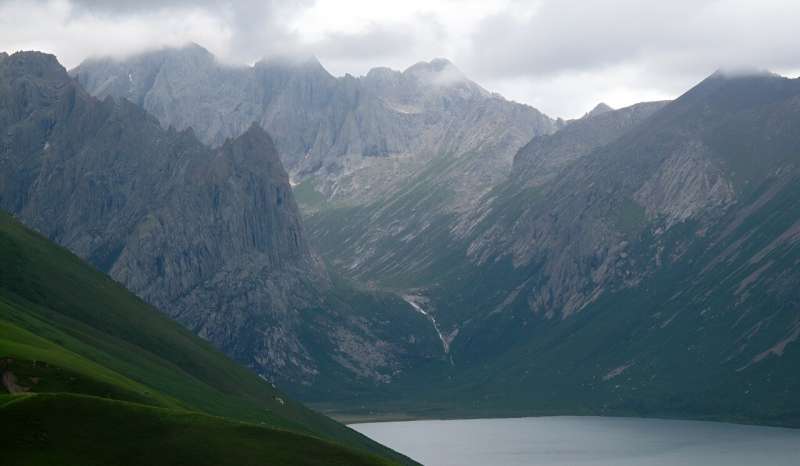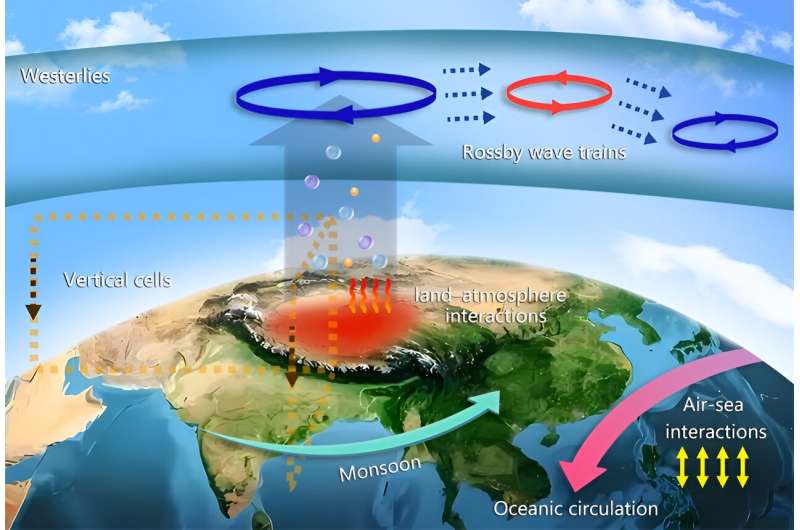This article has been reviewed according to Science X's editorial process and policies. Editors have highlighted the following attributes while ensuring the content's credibility:
fact-checked
proofread
Earth's 'third pole' and its role in global climate

Located at the intersection of South, Central, and East Asia, the massive Tibetan Plateau is often considered to be Earth's "third pole." A land of large glaciers, permafrost, and heavy snow, the plateau feeds a vast network of rivers, including major waterways like the Ganges, Indus, Mekong, Yangtze, and Yellow. These rivers, which together make up Asia's "water tower," provide water to nearly 40% of the world's population.
The Tibetan Plateau also plays a substantial role in the global climate system by affecting atmospheric circulation and driving weather patterns, such as the Asian summer monsoon, around the planet. And in turn, climate crucially influences the plateau. A projected warmer and wetter climate will affect the region's glaciers, snow cover, permafrost, runoff, and vegetation, affecting ecosystems locally and globally.
Jianping Huang and colleagues have reviewed the latest research investigating the Tibetan Plateau's role in and susceptibility to the changing climate. Although inquiry into the plateau's influence on climate dates to the 1880s, recent advances in observational data and numerical modeling are offering new insights.
The researchers divide their review into six thematic sections, covering observations of land-atmosphere interactions, climate system changes over the Tibetan Plateau, the plateau's effects on atmospheric species transport, thermal and dynamical forcing of the plateau, its modulation of the global climate, and potential future changes in the plateau's climate and forcings. For example, they discuss research demonstrating how the plateau drives surface pollutants into the upper troposphere during the Asian summer monsoon. They also outline how the plateau couples with the monsoon to influence global climate patterns in the summer, whereas in the winter, it drives the climate through its effects on planetary Rossby waves.

In addition, the authors identify a suite of needs for future research, such as the following:
- improving data collection to quantitatively understand the role of climate on diabatic heating over the plateau
- improving the temporal resolution of observations (e.g., hourly to daily) to model atmospheric processes like clouds and precipitation more accurately
- improving regional and global climate model systems to reduce biases in their representation of the plateau
- crafting a complete physical image of the Tibetan Plateau's climate dynamics and thermal effects on the global climate
Focusing on these improvements will help scientists gain a more complete and systematic understanding of the plateau and its place in the current and future climate, the authors say.
More information: Jianping Huang et al, Global Climate Impacts of Land‐Surface and Atmospheric Processes Over the Tibetan Plateau, Reviews of Geophysics (2023). DOI: 10.1029/2022RG000771
Provided by Eos
This story is republished courtesy of Eos, hosted by the American Geophysical Union. Read the original story here.





















